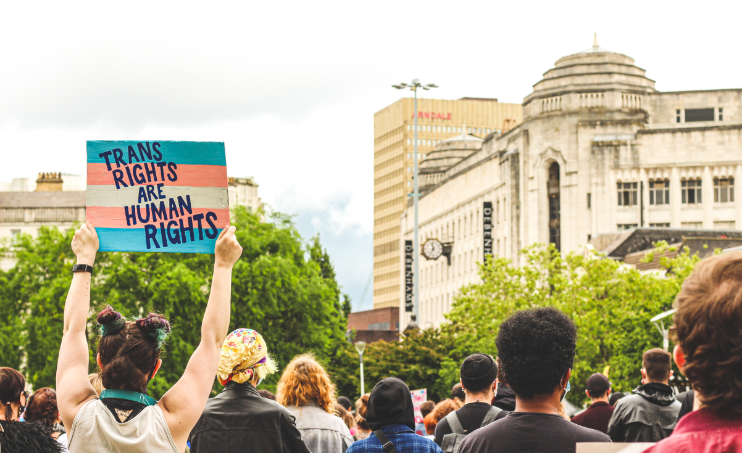
By Dr Charlotte Galpin, Associate Professor and Head of Equality, Diversity and Inclusion, School of Government and Dr Gina Gwenffrewi, Co-Director of SUISS at the University of Edinburgh
The climate for minorities in the U.K. at the moment is fearful, and febrile. LGBT History Month provides an opportunity to shine a spotlight on an increasingly hostile climate for trans people, often dropped from conversations that prioritise the LGB, forgetting the T that has been so integral to queer movements in history.
The U.K.’s intensifying climate of transphobia was recently highlighted by the Council of Europe, which supported a 2020 report on rising hate against LGBTI people in Europe. The report noted a ‘sharp increase’ in transphobic hate crimes and the dominance of anti-trans narratives in the U.K. VICE magazine’s recent exposé of the U.K.’s Equality and Human Rights Commission (EHRC) has also revealed the EHRC’s ongoing discussions with anti-trans groups while it reneges on the trans-inclusive policy positions it once championed.
In solidarity with distressed trans communities, a coalition of LGBT-supportive charities, networks and organizations across the U.K., from Stonewall to the Equality Network, and from Mermaids to the Good Law Project, is demanding an investigation into the EHRC, while highlighting the broader moral panic waged by government-appointed agencies and the legacy media against trans rights. Worryingly, the VICE exposé extends beyond the threat to trans rights; various sources have highlighted a pattern of denial by government-appointed commissions of institutional racism and sexism, which signals in turn to U.K. minorities that their oppression will not be recognized by the bodies meant to protect them.
Perhaps most concerning is the legacy media’s apparent complicity. The Council of Europe report identified “vitriolic media campaigns … in which trans women are vilified and misrepresented”. The VICE story has been ignored by every national newspaper, a striking difference from the year-long legacy media campaign against the LGBT+ charity Stonewall for its support for trans inclusion. Back in 2012, the Leveson Inquiry into the Culture, Practices and Ethics of the Press concluded there was a climate of prejudice and a failure to treat trans and intersex people with dignity and respect.
On social media, trans people are further subjected to high levels of transphobic abuse. Research by the Trans Safety Network and investigative journalists has demonstrated connections between so-called ‘gender-critical’ feminist groups in the UK with far-right groups, particularly in the US. Anti-trans groups employ similar online strategies, orchestrating online campaigns of abuse against trans people and their allies. While social media has opened up vital opportunities for trans people to create communities, campaign, and advance trans rights, it has also been described as a ‘double-edged sword’. This visibility is accompanied by a proliferation of anti-trans disinformation and almost inevitable backlash via online abuse when trans people and allies advocate publicly for trans rights, sometimes even forcing them to retreat from the public eye.
Despite this, the U.K.’s legacy media presents trans people not as targets of harassment but as instigators. This is the basis of our current research project, which includes analysing the legacy media’s framing bias against trans people and their rights through its use of trans-delegitimizing discourses, as well as via selective facts in ways that echo the reporting of a ‘Gay panic’ in the 1980s and 90s. Our hope is that our research can contribute to an informed understanding of the moral panic and abuse currently directed against trans people, as well as against marginalized minorities across the U.K. generally.
The patterns of legacy and social media exclusion raise fundamental questions about power and U.K. democracy. What we see is the ideological curation of abuse, tainting minorities with culpability, while those in power or in alignment with the status quo, are portrayed as the victims. The mass media, as an important arena of the public sphere, is assumed to be a space for democratic engagement and collective will-formation. The silencing and often violent exclusion of trans people from public conversations about their own humanity needs to be understood as a form of ‘participatory inequality’. Democracy depends upon the ability of everybody being able to participate in debates about issues that affect them. Without fair representation of trans issues and the safe participation of trans people in debates about their rights and own lived experiences, the U.K. is a long way from having a truly inclusive democratic public sphere.
- Find out more about LGBTQ+ History Month at the University of Birmingham
- Find out more about Dr Charlotte Galpin
- Find out more about Dr Gina Gwenffrewi
- Back to Social Sciences Birmingham
